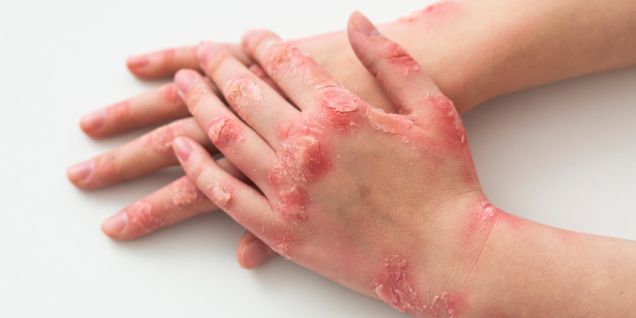What Are The Causes Of Eczema In Adults?


Table Of Content
Because the itching typically occurs first, it is commonly referred to as "the itch that rashes." In infants and young children, this group of skin rashes is particularly prevalent. Adults can also develop it, frequently on their hands or as scaly, leathery patches. There are various varieties of eczema and a wide range of therapies, while atopic dermatitis is a prevalent and frequently inherited variant.
What specifically causes eczema is unknown (often called atopic dermatitis). According to the American Academy of Dermatology (AAD), atopic dermatitis is a complicated skin condition brought on by the interaction of a person's genes and environment. When exposed to allergens or topical irritants, eczema patients usually have a hyperactive immune system that results in inflammation.
There are many risk factors for eczema. Some of the causes of eczema include stress or allergies. All of these environmental risk factors can increase the degree, intensity, and frequency of eczema flare-up if you have hay fever (also known as rhinitis), reside in chilly mountainous areas, places that are cold and damp for at least part of the year or live in places that are swampy and hot.
Other environmental risk factors include having extremely dry skin, coming into contact with allergic substances in shampoo or cleansers, and having certain food.
• Eczema is brought on by a confluence of immune system activity, genetics, environmental variables, and stress (atopic dermatitis).
• Your immune system: If you have eczema, your immune system overreacts to trivial allergens or irritants. Skin irritation could result from this overreaction.
• You are more likely to get eczema if your family has a history of dermatitis. Additionally, your risk increases if you have a history of allergies, hay fever, or asthma. Foods, pet hair, and pollen are a few allergens that might trigger allergic reactions. A protein that supports the preservation of healthy skin in your body may also be affected by changes in your genes. If specific proteins are absent from your regular diet, your skin won't be completely healthy.
• The surroundings: Several items in your environment can irritate your skin. A few examples include exposure to tobacco smoke, smog, harsh soaps, wool clothes, and certain skin care treatments. In low humidity, your skin could feel dry and inflamed (dry air). In hot and humid weather, sweating can make the itching worse.
• Your level of stress: Stress can cause or exacerbate eczema. Stress can manifest as both physical and mental/emotional problems.
For those with eczema, some therapies work better than others. Topical steroids, such as topical corticosteroids and steroid lotions, are frequently given by healthcare professionals. However, they might cause difficulties and side effects in patients with sensitive skin or atopic dermatitis. You can read a more thorough treatment manual produced by the National Eczema Association here. Additionally, it's critical to understand that psoriasis symptoms might be mistaken for those of eczema.
Atopic dermatitis, contact dermatitis, dyshidrotic eczema, neurodermatitis, nummular eczema, seborrheic dermatitis, and stasis dermatitis are just a few of the seven different types of eczema. For more information, read our overview here.
Using gentle soaps and detergents is one way to prevent eczema, as is the following general advice:
• Avoiding perfumes or fragrances
• Using cooler water for baths and showers
• After bathing, gently toweling or drying the skin
• Refrain from rubbing or scratching eczema spots, as this can exacerbate the condition and raise the risk of infection
• Frequently and thoroughly moisturizing with mild, oil-rich products
• Using non-cosmetic moisturizers to keep the skin moisturized after baths and showers.
• Putting on natural-fiber garments and avoiding tight clothing
• Working with their physician or dermatologist to pinpoint what sets off or exacerbates their symptoms will be beneficial for people with eczema. Eczema can be avoided or reduced to a certain extent by avoiding certain triggers or allergies.
Although atopic eczema can affect any area of the body, in adults, it most frequently affects the face and scalp, hands, inner elbows, and backs of the knees. Atopic eczema sufferers typically experience periods when symptoms are less noticeable, as well as times when symptoms worsen (flare-ups).
Related Post
Lip Fillers Before and After: A Detailed Guide
You may believe you've read everything about lip fillers. However, Lip Filler Before and After should be thoroughly understood if you're considering this cosmetic process.
Quick And Easy Hair Care Routine For Managing Fluffy Hair
Fluffy hair affects many people. Overvolume causes it. Hormones and genetics can cause this. It can be effectively managed and eliminated. How to get rid of and manage fluffy hair is covered here.
The Pros & Cons of Anti Eyebrow Piercings
People rarely have anti eyebrow piercings, making them difficult to learn about. You should get all the facts straight before you commit to this piercing, though, since it's such an obvious one.
Tips & Tricks For Maintaining Your Neck Beard
Take your time shaving around the beard just as you would when shaving your face. It takes time to shave properly, especially when it comes to pre- and post-shave care.
Popular
6 Affordable Makeup Organizers To Declutter Your Vanity
For the makeup lovers! Here are the best 6 Affordable Makeup Organizers To Declutter Your Vanity.
Look at the Stunning Debut of Alia Bhatt at the Met Gala 2023
Alia Bhatt Met Gala 2023 debut was a huge success, and she certainly made a mark with her stunning look. Now grab for more details here!
Crunches Vs. Sit-Ups: Which One Is Best For Your Abs?
Exercises that burn fat can help you lose weight .If you want to know Crunches Vs. Sit-ups: Which one is best for your Abs read below
Black Seed Oil Benefits For Hair and Skin
Black seed oil offers a wide range of benefits for hair and skin. Now get more information about black seed oil visit the blog!
